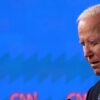A state court judge has ruled that USA Powerlifting discriminated against a biological male athlete who identifies as a woman when it banned him from competing in its women’s division. USA Powerlifting must now let JayCee Cooper and other male athletes who identify as “transgender” compete in the division, regardless of whether they have been on puberty blockers or other medications associated with a so-called transition.
The ruling, released Feb. 27, mandated that USA Powerlifting “cease and desist from all unfair discriminatory practices” and revise its sexual orientation and gender identity policy within two weeks. This ruling is disappointing on many levels for female athletes who wish to compete in fair athletic events at any level in Minnesota. It’s also demonstrative of a growing trend in sports nationwide.
The ruling is clear and states:
The Daily Signal depends on the support of readers like you. Donate now
In this case, however, there is but a single reason USAPL prohibited Cooper from competing in the female category. That reason is based entirely on protected status. The only reason USAPL offered, the only reason stated in its policy, and the only reason the record supports, is Cooper’s protected status. Cooper was discriminated against because of her sexual orientation and because of her sex. We know that because the only basis for the decision in USAPL’s policy is sex and sexual orientation. As USAPL’s president wrote, ‘[w]e do not allow male to female transgender athletes at all. Full stop.’
The most disappointing part about this ruling is that it recognizes no inherent differences between male and female bodies, physiologically or otherwise. Cooper had been on spironolactone for over a year, which, according to the ruling, “blocks androgen receptors and lowers the amount of testosterone the body makes.” However, taking the drug did not change the fact that Cooper’s bone and muscle structure as a male are inherently different than that of females.
In November 2018, Cooper purchased a membership in USA Powerlifting to compete in its Minnesota-based competitions.
“At the time, USAPL had a policy, dating from at least as early as 2015, that trans women, that is, women who were identified as male at birth, but who identified as female, were not allowed to compete as female,” according to the ruling.
The organization held firm to that decision.
This was based on the decision in 2014 or 2015 of the medical commission of the International Powerlifting Federation (an international governing body with which USA Powerlifting was then affiliated) that, according to the ruling, “concluded that participation by trans women in the women’s division would represent a fundamental unfairness.”
Cooper first filed a discrimination claim against USA Powerlifting in 2019 with the Minnesota Department of Human Rights. Then in January 2021, an organization called Gender Justice filed a lawsuit against the organization in state court on Cooper’s behalf.
In 2015, the International Olympic Committee adopted guidelines that permitted biological males to compete against women if their testosterone remained below a certain level for at least 12 months. The International Powerlifting Federation adopted the Olympic Committee’s guidelines, but the international group doesn’t mandate that its affiliates follow them. And USA Powerlifting did not.
This ruling seems especially egregious given the obvious, which USA Powerlifting explained in its “Transgender Participation Policy”: Powerlifting is clearly a sport that recognizes strength above all else—strength that seems inherent in biological males whose muscles are naturally larger. Women would naturally be at a disadvantage competing against biological men who’d gone through puberty.
“Men naturally have a larger bone structure, higher bone density, stronger connective tissue and higher muscle density than women,” the policy says. “These traits, even with reduced levels of testosterone do not go away. While [males who identify as female] may be weaker and less [muscular] than they once were, the biological benefits given them at birth still remain over [that] of a female.”
This statement seems to be fair, accurate, and common sense. Cooper knew this policy existed and yet applied anyway. When the organization rejected Cooper based on the athlete’s transgender status, Cooper complained about it on Instagram, drawing the ire of Rep. Ilhan Omar, D-Minn., who slammed USA Powerlifting’s policy as “discriminatory” and “unscientific.”
It’s disappointing to see such a ruling come out of Minnesota, but then it’s not surprising given today’s rhetoric, the forcing of women to compete alongside biological males in other sports, Minnesota’s penchant for liberalism, and the Supreme Court’s Bostock ruling in 2020, where the court stretched Congress’ legal protections for people on the basis of race, color, religion, sex, or national origin under the Civil Rights Act of 1964 to also include being gay or transgender.
The Daily Signal publishes a variety of perspectives. Nothing written here is to be construed as representing the views of The Heritage Foundation.
Have an opinion about this article? To sound off, please email letters@DailySignal.com, and we’ll consider publishing your edited remarks in our regular “We Hear You” feature. Remember to include the URL or headline of the article plus your name and town and/or state.






























